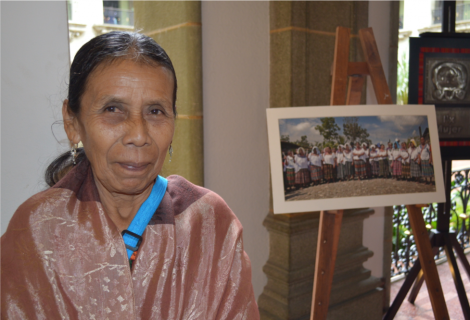Guatemalan president must reverse amnesty proposal for perpetrators of crimes against humanity

A stalemate in Guatemalan congress has left hundreds of campaigners, who survived slavery and systematic rape at the hands of military officers, in fearful limbo until a date is set for a new vote on a controversial bill. The Guatemalan government’s proposal is to grant a total amnesty for war criminals previously convicted for crimes against humanity during the armed conflict of the 1980s in the Central American nation, currently run by President Jimmy Morales, who is campaigning for reelection in June.
The reform to the National Reconciliation Law, brought in under the 1996 peace agreement, which ended a bloody 30-year civil war, would reverse the justice promised to survivors of crimes such as genocide, forced disappearance, rape and torture. The criminals, largely former military soldiers, convicted of committing atrocities against indigenous civilians, could be released from prison within 24 hours if the vote is passed.
ActionAid and its Spanish arm, Alianza por la Solidaridad, are calling on the Guatemalan president to repeal the proposal to change the constitution, with immediate effect.
Adriano Campolina, ActionAid’s secretary general, said:
“The decision to release former military soldiers convicted of crimes against humanity, including genocide and the systematic kidnapping, raping and enslaving of women, would be a grave injustice. This outrageous, last minute, pre-election change to the constitution would reverse years of work to reconcile the Guatemalan people and secure justice for the indigenous communities massacred during the conflict., to which no-one wants to return.”
ActionAid, established in Guatemala in 1996 as the peace accords were signed, has remained dedicated to the promotion of human rights and the fight against poverty and inequality. With partners including Women Transforming the World (MTM), ActionAid succeeded in imprisoning soldiers in the landmark 2016 the case brought by indigenous women who were kidnapped, raped and enslaved by the military in a small community near the Sepur Zarco outpost.
Women survivors fought for justice at the highest court of Guatemala, resulting in the conviction of two former military officers for crimes against humanity and were granted 18 reparation measures to their community, including education for their children, access to land, a health-care clinic and plans to help end the abject poverty suffered by their community for generations.
Demecia Yat, survivor and representative of the Sepur Zarco case, has sent a letter to the heads of the political parties, which states:
"We are totally opposed to these reforms because there are several people responsible for human rights violations, as proven in the courts, who are therefore condemned. We went through a lot of suffering before and after, when we followed the trial. Those reforms only want to free them and others pending trial.”
Other crimes likely to be exonerated include a case of Genocide (massacres against the Ixil people), the disappearance of a child, Molina Theissen and the Coban massacre, where more than 500 skeletons were found in a clandestine cemetery on a military base.
“This amnesty law would contravene the peace agreements and will allow the release of perpetrators of crimes against humanity and the return to the realm of impunity, destroying the trust of Guatemalans in the rule of law and the possibility of a better future.” continued Campolina.
ActionAid has sounded the alarm about a deluge of damaging reforms which are destroying democracy, including the expulsion of the International Commission Against Impunity in Guatemala and the imprisonment of environmental leaders such as Bernardo Caal Xol, now a prisoner for defending an indigenous river from two hydroelectric plants (Oxec and Renace).
Even more concerning is the newly proposed reform of the NGO Law, which will limit freedom of expression and stonewall civil society’s capacity to react to events that affect the human rights of the Guatemalan population.
“This shrinking political space is remarkably dangerous and irresponsible, in a context where the current government, chaired by Jimmy Morales, fails to execute its annual budgets, so it is precisely this international cooperation with NGOs which replaces the State by offering crucial and basic services to the population.” concluded Campolina.

